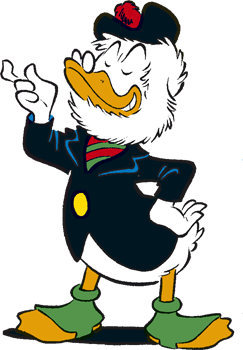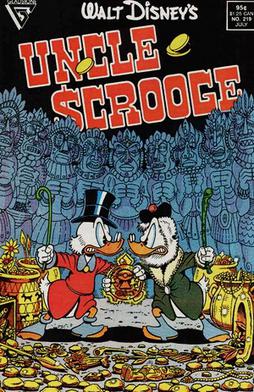
Carl Barks was an American cartoonist, author, and painter. He is best known for his work in Disney comic books, as the writer and artist of the first Donald Duck stories and as the creator of Scrooge McDuck. He worked anonymously until late in his career; fans dubbed him The Duck Man and The Good Duck Artist. In 1987, Barks was one of the three inaugural inductees of the Will Eisner Comic Book Hall of Fame.

The Clan McDuck is a fictional Scottish clan of cartoon ducks from which Disney character Scrooge McDuck is descended. Within the Donald Duck universe, the clan is related to the American Duck family through the marriage of Hortense McDuck and Quackmore Duck, Donald and Della Duck's parents, giving both of them partial Scottish ancestry.

Flintheart Glomgold is a cartoon character created in 1956 by Carl Barks. He is a South African American Pekin Duck and the business rival of Scrooge McDuck, usually portrayed as an ambitious, ruthless, and manipulative businessman who shares many of the same qualities as Scrooge—the drive for massive wealth, and the cunning and creativity to obtain the same—but he lacks any of Scrooge's tendencies towards generosity and compassion. In Don Rosa's The Life and Times of Scrooge McDuck, he is said to be a Boer.

Mickey Mouse Works is an American animated television series produced by Walt Disney Television Animation featuring Mickey Mouse and his friends in a series of animated shorts. The first Disney television animated series to be produced in widescreen high definition, it is formatted as a variety show, with skits starring Mickey Mouse, Minnie Mouse, Donald Duck, Daisy Duck, Goofy, Pluto and Ludwig Von Drake while Horace Horsecollar, Clarabelle Cow, Morty and Ferdie Fieldmouse, Huey, Dewey and Louie, Chip 'n' Dale, Scrooge McDuck, Pete, Humphrey the Bear, J. Audubon Woodlore, Dinah the Dachshund, Butch the Bulldog, Mortimer Mouse, José Carioca, and Clara Cluck appear as supporting or minor characters. Musical themes for each character were composed by Stephen James Taylor with a live 12-piece band and extensive use of the fretless guitar to which the music of the series was nominated for an Annie Award in both 1999 and 2001. Most of the shorts from the series were later used in House of Mouse.

The Duck family is a fictional family of cartoon ducks related to Disney character Donald Duck. The family is also related to the Coot, Goose, and Gander families, as well as the Scottish Clan McDuck. Besides Donald, the best-known members of the Duck family are Huey, Dewey, and Louie, Donald's triplet nephews.
John Percival Martin was an English author best known for his Uncle series of children's stories.

Uncle Cleans Up (1965) is a children's story written by J. P. Martin as part of his Uncle series.

Mr. Duck Steps Out is a Donald Duck cartoon produced by Walt Disney Productions, which is released on June 7, 1940, and featured the debut of Daisy Duck. The short was directed by Jack King and written by Carl Barks, Chuck Couch, Jack Hannah, Harry Reeves, Milt Schaffer, and Frank Tashlin.

Good Scouts is a 1938 American animated short film produced by Walt Disney Productions and released by RKO Radio Pictures. The cartoon follows Donald Duck leading his nephews Huey, Dewey, and Louie on a scouting trip through the wilderness. It was directed by Jack King and features Clarence Nash as Donald and the three nephews.
"The Golden River" is a Disney comics story written and drawn by Carl Barks in 1957 and first published in 1958, in Uncle Scrooge #22. It is somewhat based on the fairy tale The King of the Golden River, by John Ruskin.

"The Son of the Sun" is the first Scrooge McDuck comic by Don Rosa, first published in Uncle Scrooge #219 in July 1987. It is a well-known comic book story that features Disney's Scrooge McDuck, Donald Duck, and his three nephews. This story is most notable for establishing Don Rosa as a major talent in the Disney comic book industry, as well as fulfilling Rosa's childhood dream of becoming a writer/illustrator of stories featuring Scrooge McDuck.
"The Money Champ" was originally published in Uncle Scrooge #27 in September, 1959 and is the second of three stories written and drawn by Carl Barks in which Scrooge's rival Flintheart Glomgold appears. Glomgold first appeared in "The Second-Richest Duck" in Uncle Scrooge #15.

"The Treasure of the Ten Avatars" is a 1996 Donald Duck story by Don Rosa.

Sitting Ducks is an animated children's television series based on the 1977 "Sitting Ducks" lithograph and the 1998 children's book of the same name, created by the poster artist Michael Bedard. The series first premiered internationally before debuting in the United States on Cartoon Network, reruns had also aired on Qubo from 2007 until 2012.

Uncle and the Treacle Trouble (1967) is a children's novel written by J. P. Martin, the fourth of his Uncle series of six books. It was illustrated, like the others in the series, by Quentin Blake.

Uncle and Claudius the Camel (1969) is a children's novel written by J. P. Martin, the fifth of his Uncle book series of six books. It was illustrated, like the others in the series, by Quentin Blake.
"The Dutchman's Secret" is a 1999 Donald Duck comic story by Don Rosa. It is a direct sequel to his 1998 story The Vigilante of Pizen Bluff and is one of his most historically accurate stories.
"Treasure under Glass" is a 1991 Uncle Scrooge comic story by Don Rosa.












